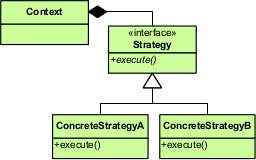The strategy pattern (also known as the policy pattern) is a behavioral software design pattern that enables selecting an algorithm at runtime. Instead of implementing a single algorithm directly, code receives run-time instructions as to which in a family of algorithms to use.
Exist a game that is compatible with two game consoles. We would use strategy pattern to allow change the way of run it depending of target console.
# Strategy
class GameConsole {
[string] $Name
hidden [DateTime] $StartTime = [DateTime]::Now
GameConsole($Name) {
$this.Name = $Name
}
[TimeSpan] GetElapsed(){
return [DateTime]::Now - $this.StartTime
}
}
It has been created a GameConsole abstract class and implemented various subclasses to implement the different Game console strategies. Each console has a different way of process a game.
Powershell Classes don’t have support for .NET Abstract classes so this is really just a base class that implements some common logic.
In this case it's defined two strategies for two different game consoles: PlayStation 4 and Xbox One.
# Concrete Strategies
class PlayStation4 : GameConsole {
Copy () : base('PlayStation4') { }
Play([Game]$g) {
# Play game in a PlayStation way
}
}
class XboxOne : GameConsole {
Copy () : base('XboxOne') { }
Play([Game]$g) {
# Play game in a Xbox One way
}
}
It should be noted that both have declared a method called Play where each would implement their specific algorithm to process a game.
The Game class have an array with the compatible game consoles and one method called play to run the game in the mentioned game consoles.
# Context
class Game {
[string] $Name
hidden [DateTime] $StartTime = [DateTime]::Now
hidden [Console[]] $GameConsoles = @()
Game ($Name) {
$this.Name = $Name
}
[TimeSpan] GetElapsed(){
return [DateTime]::Now - $this.StartTime
}
[Game] AddGameConsole([GameConsole]$GC) {
$this.GameConsoles += $GC
return $this
}
[Game] Play() {
$this.GameConsoles | ForEach-Object {
try {
$_.Play($this)
}
catch {
Write-Host "ERROR:$($_.Exception.Message)")
break
}
}
return $this
}
}Finally, the main code would look like this:
# Main code
[Game]::New("Red Dead Redemption 2").
AddGameConsole([PlayStation4]::New()).
AddGameConsole([XboxOne]::New()).
Play()

